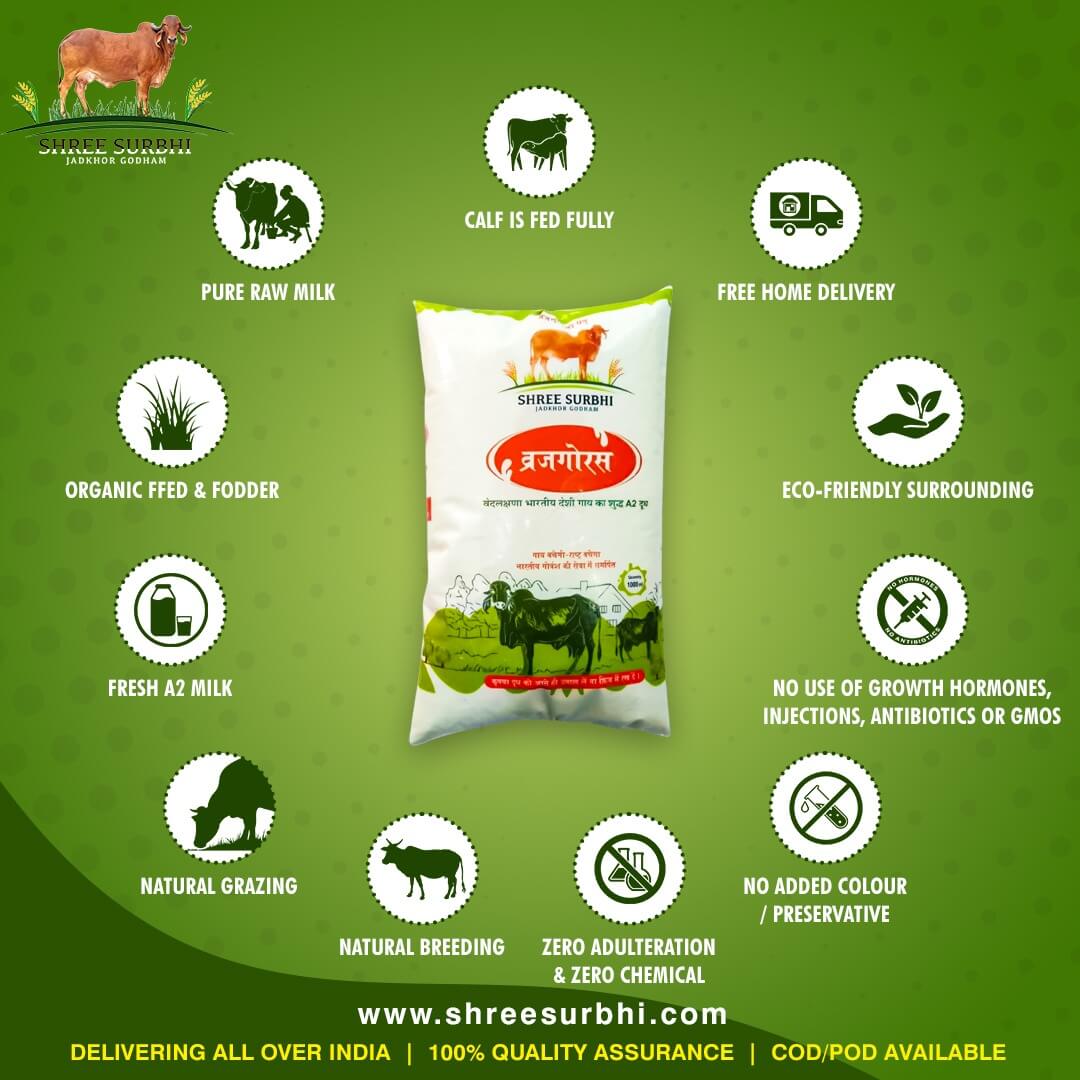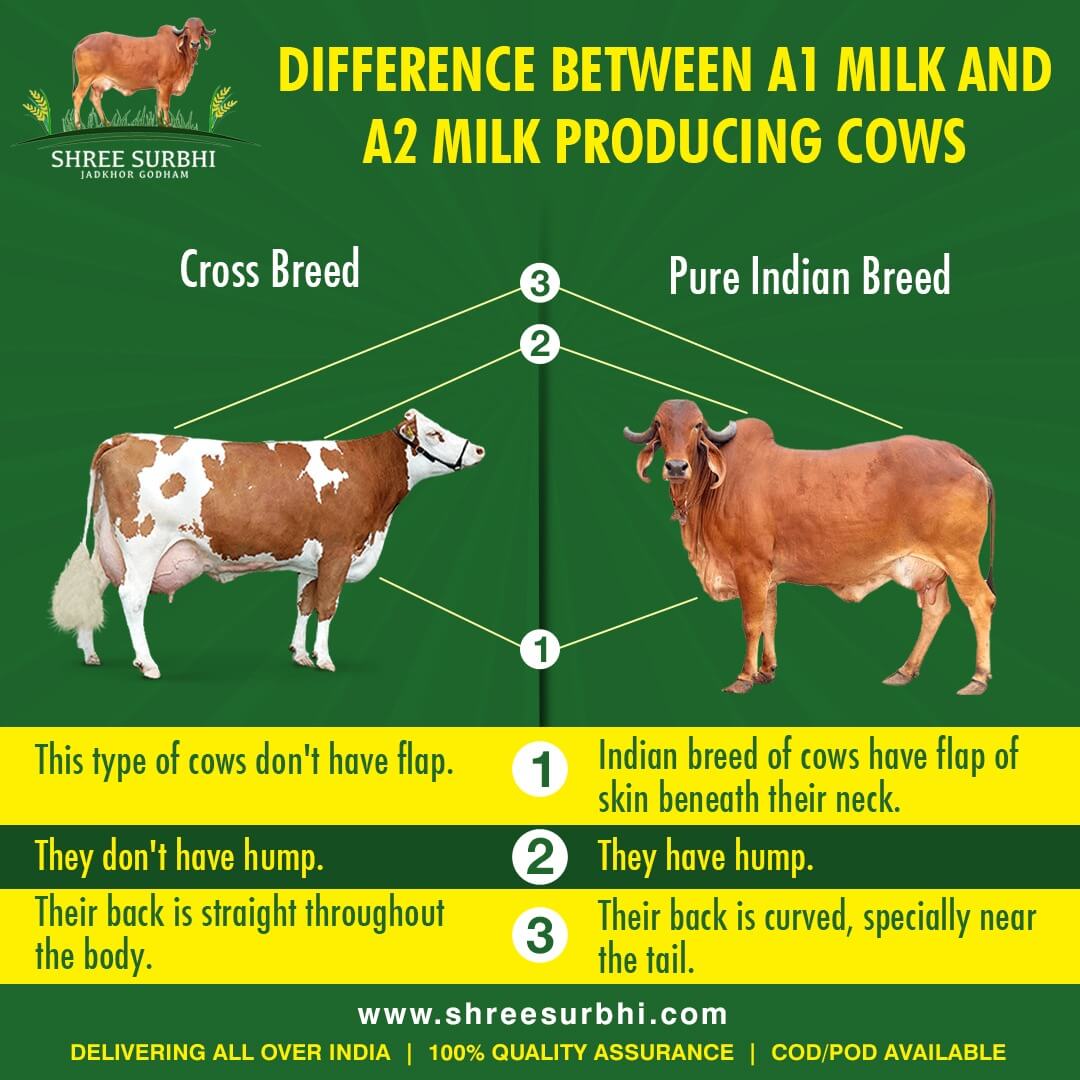- Your cart is empty
- Continue shopping

Wondering Why To Join us?
We at Shree Surbhi works with a vision of commitment towards our customers and maintain a seal of trust. With over 11000 Desi Indian cows in our gaushala at Jadkhor Godham, we believe in delivering the A2 milk of Desi Indian Cows in the purest way possible to you. Our rigorous quality assurance tests make sure that you and your family are always protected from the harmful effects of regular milk.

Why Shree Surbhi A2 Milk?
A glass of milk might turn into your child’s beloved beverage with Shree Surbhi’s Indian Desi Cow A2 Milk. The regular pleasantness of our cow’s milk is the sign of immaculateness and turns into a moment top pick among kids. In addition, we source our milk from a blend of Desi Gir cows, desi Sahiwal cows, run it through 70 severe tests for contaminations and convey it to you within 24-36 hours of draining. No additives, no milk powder or cream is added to the milk and the milk isn’t recombined in any structure. We deliver the milk under the best virus affix straight up to your doorstep.
A1 vs A2 Milk

The science behind it
Both A1 and A2 are proteins in the casein family, which makes up about one-third of all the proteins in human milk, but about 80 percent of the proteins in cow’s milk. The two proteins are almost identical — they each contain 209 amino acids, the building blocks of any protein. The only difference between A1 and A2 is a difference in the 67th amino acid in the chain. At this position, A1 has a histidine amino acid, while A2 has a proline amino acid. The entire basis of the supposed problem with A1 milk is its pesky histidine amino acid at position 67. That one amino acid change means when the A1 protein is broken down, it can create the peptide BCM-7. BCM-7 is related to the opiate family, and has been found to have a wide range of effects in animals if injected directly into the blood. A1 and A2 proteins affect the body differently. When A1 protein is digested in the small intestine, it produces a peptide called beta-casomorphin-7 (BCM-7). The intestines absorb BCM-7, and it then passes into the blood. Doctors have linked BCM-7 to stomach discomfort and symptoms similar to those experienced by people with lactose intolerance. The structure of A2 protein is more comparable to human breast knigi1886.
A1 Milk
1. Research showed that A1 milk could impact brain function. Study participants took longer to process information and made more errors on a test after drinking regular milk compared to A2 milk.
2. The body tries to breakdown casein in A1 milk, a chemical component called BCM-7 is released, which is the reason for morphine-like effects on the Central Nervous system. Neuro disorders like cognitive disorders, which affect learning ability and aggravated symptoms of autism, are also caused by A1 milk.
3. A1 milk protein has ‘Histidine’ at 67th position which is released to form Histamine (causing allergic reactions). As a result of this, kids tend to develop allergic dermatitis (allergy on skin), allergic rhinitis (running nose) allergic cough and asthma.
A2 Milk
1. A2 Cow Milk is a rich source of minerals such as calcium, potassium, phosphorus which are necessary for strong bones and teeth, better functioning of muscles, regulation of blood pressure, tissue and cell growth, and maintain overall nourishment of the body.
2. The A2 beta-casein protein present in A2 Milk breaks down into amino acids for quick digestion, which results in improving our overall health and increases the nutritional value derived from Cows Milk.
3. A2 Cow Milk also has essential vitamins like Vitamin A, D and B12 which are necessary for bones and teeth, building immunity, and converting food into energy. A2 milk contributes equally in building immunity, increasing metabolism, and providing Omega 3 fatty acids. These fatty acids contribute highly to mental growth too.

